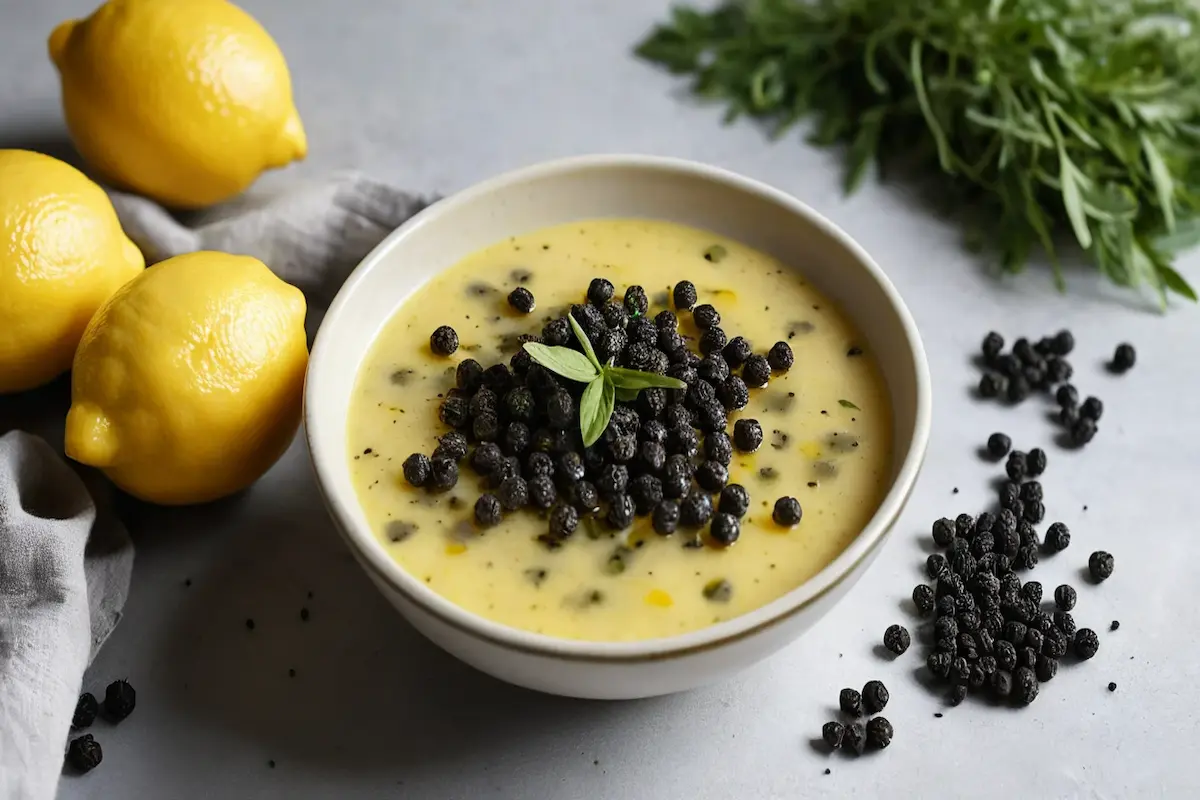Introduction to Lemon Pepper Sauce
Lemon pepper sauce is an irresistible blend of tangy lemon, aromatic black pepper, and rich butter or oil. This versatile condiment has become a staple in kitchens worldwide, enhancing the flavor of dishes ranging from chicken wings to roasted vegetables. Whether you’re a culinary enthusiast or a home cook aiming to elevate your meals, understanding the nuances of lemon pepper sauce can significantly enhance your culinary repertoire.
In this comprehensive guide, we’ll explore the origins of lemon pepper seasoning, its evolution into a sauce, and the essential ingredients that contribute to its unique flavor profile. We’ll also delve into various preparation methods, popular variations, and the myriad of culinary applications that make this sauce a favorite among food lovers. Additionally, we’ll discuss the health benefits associated with its components and provide answers to frequently asked questions to ensure you have all the information needed to master lemon pepper sauce.
For those eager to get started, here’s a Lemon Pepper Sauce Recipe that offers a quick and easy preparation method, ensuring perfect results every time.
Historical Background of Lemon Pepper Sauce
Origins of Lemon Pepper Seasoning
The combination of lemon zest and black pepper has been cherished for centuries, particularly in Mediterranean cuisine. The zesty brightness of lemon complements the pungent warmth of black pepper, creating a harmonious balance that enhances a variety of dishes. This pairing was traditionally used to season meats and seafood, providing a fresh and vibrant flavor profile that became a hallmark of regional culinary practices.
Evolution into Sauce Form
While lemon pepper seasoning began as a dry rub, its transformation into a sauce is a more recent culinary innovation. In the United States, particularly in Southern cuisine, lemon pepper sauce has gained immense popularity as a coating for chicken wings and seafood. This evolution allowed for a more versatile application, enabling the sauce to be used as a marinade, dressing, or dipping sauce, thus broadening its appeal across various culinary traditions.
For creative ways to incorporate this zesty blend into your cooking, explore 5 Delicious Ways to Use Lemon Pepper Spice Blend.
Essential Ingredients and Their Roles in Lemon Pepper Sauce
Crafting the perfect lemon pepper sauce hinges on the quality and balance of its ingredients. Here’s a breakdown of the core components:
- Fresh Lemon Juice and Zest: Provides the foundational tangy and citrusy flavor essential to the sauce’s character.
- Ground Black Pepper: Imparts a sharp, pungent heat that balances the acidity of the lemon.
- Butter or Olive Oil: Acts as the base, offering a rich and smooth texture that carries the flavors.
- Garlic (Optional): Adds depth and aromatic complexity, enhancing the overall flavor profile.
- Honey (Optional): Introduces a subtle sweetness that can mellow the acidity and spice, creating a more rounded taste.
- Herbs (Optional): Fresh herbs like parsley, dill, or thyme can add freshness and additional layers of flavor.
Selecting high-quality, fresh ingredients ensures that your lemon pepper sauce achieves its full potential in both taste and texture.
Preparation Methods for Lemon Pepper Sauce
Creating lemon pepper sauce at home is a straightforward process that allows for customization to suit your taste preferences. Here’s a step-by-step guide:
- Gather Your Ingredients: Assemble fresh lemon juice and zest, freshly ground black pepper, butter or olive oil, and any optional additions like minced garlic, honey, or chopped herbs.
- Heat the Base: In a saucepan over medium heat, melt the butter or warm the olive oil until shimmering.
- Incorporate Aromatics: If using garlic, add it to the pan and sauté until fragrant, being careful not to let it burn.
- Add Lemon and Pepper: Pour in the lemon juice and zest, then stir in the ground black pepper.
- Simmer and Adjust: Allow the mixture to simmer gently, reducing slightly to thicken. Taste and adjust seasoning, adding honey for sweetness or additional pepper for heat as desired.
- Finish with Herbs: If using fresh herbs, stir them in at the end to preserve their bright flavor and color.
Tips for Optimal Results
- Use Fresh Ingredients: Freshly squeezed lemon juice and freshly ground black pepper significantly enhance the sauce’s flavor.
- Control the Consistency: For a thicker sauce, continue to simmer until it reaches the desired consistency, or add a small amount of cornstarch slurry.
- Balance Flavors: Taste as you go, adjusting acidity, sweetness, and spiciness to achieve a harmonious balance.
Variations of Lemon Pepper Sauce
The versatility of lemon pepper sauce allows for numerous adaptations to cater to different dietary preferences and flavor profiles. Here are some popular variations:
- Creamy Lemon Pepper Sauce: Incorporate heavy cream or cream cheese to create a richer, velvety texture, ideal for pasta dishes.
- Spicy Lemon Pepper Sauce: Add red pepper flakes or a dash of cayenne pepper to introduce a spicy kick, perfect for those who enjoy heat.
- Vegan Lemon Pepper Sauce: Replace butter with plant-based margarine or coconut oil, and use agave syrup instead of honey to make the sauce vegan-friendly.
- Herb-Infused Lemon Pepper Sauce: Simmer the sauce with sprigs of fresh herbs like rosemary or thyme to impart additional aromatic flavors.
Experimenting with these variations can lead to delightful new applications and keep your dishes exciting.
Culinary Applications of Lemon Pepper Sauce
The adaptability of lemon pepper sauce makes it a valuable addition to a wide array of dishes. Here are some ways to incorporate it into your cooking:
- Marinade for Proteins: Use as a marinade for chicken, fish, shrimp, or tofu. The acidic nature of the lemon juice tenderizes the proteins while infusing them with flavor.
- Dressing for Vegetables: Drizzle the sauce over roasted vegetables like asparagus, broccoli, or carrots to elevate their taste.
- Sauce for Pasta: Toss linguine, spaghetti, or penne with the sauce for a simple yet flavorful dish.
- Dip for Snacks: Serve it as a dip for fries, onion rings, or chicken nuggets, adding a zesty punch to your snacks.
- Spread for Sandwiches: Use it as a spread on sandwiches or wraps to bring a tangy zest to each bite.
Perfect Pairings
To further enhance your dishes, consider pairing lemon pepper sauce with complementary ingredients:

- Proteins: Chicken wings, salmon, and shrimp work exceptionally well with this sauce.
- Sides: Mashed potatoes, couscous, or rice pilaf make excellent accompaniments.
- Beverages: Pair your dish with a crisp white wine or sparkling water with a twist of lemon to complement the citrusy flavors.
Health Benefits and Nutritional Information
Beyond its taste, lemon pepper sauce offers a variety of health benefits due to its nutrient-rich ingredients:
- Rich in Vitamin C: Lemon juice is packed with Vitamin C, which supports the immune system and skin health.
- Antioxidant Properties: Black pepper contains piperine, a compound with antioxidant and anti-inflammatory properties.
- Low-Calorie Option: When made with olive oil, it serves as a heart-healthy and calorie-conscious choice.
However, be mindful of portion sizes, particularly if using butter or cream-based variations, as they can be higher in fat and calories.
Homemade vs. Store-Bought Lemon Pepper Sauce
Choosing between homemade and store-bought sauce depends on your priorities. Here’s a comparison:
Homemade Lemon Pepper Sauce
- Pros:
- Full control over ingredients, flavor, and consistency.
- No artificial additives or preservatives.
- Customizable to dietary needs and taste preferences.
- Cons:
- Requires time and effort to prepare.
Store-Bought Lemon Pepper Sauce
- Pros:
- Convenient and quick for busy schedules.
- Widely available in various flavors.
- Cons:
- May contain high sodium, preservatives, or artificial flavors.
- Limited customization options.
Whenever possible, opt for homemade to ensure freshness and flavor authenticity.
Frequently Asked Questions (FAQs)
What is lemon pepper sauce made of?
The basic ingredients are lemon juice, zest, black pepper, and butter or olive oil. Optional additions include garlic, honey, and fresh herbs.
How can I thicken lemon pepper sauce?
Simmer the sauce longer to reduce the liquid, or add a cornstarch slurry for quicker thickening.
Is lemon pepper sauce spicy?
Typically, it’s tangy and zesty rather than spicy. For heat, you can add red pepper flakes or cayenne pepper.
Can I make lemon pepper sauce ahead of time?
Yes, the sauce can be made in advance and stored in the refrigerator for up to a week.
How do I store leftover lemon pepper sauce?
Store in an airtight container in the refrigerator. Reheat gently on the stovetop to maintain flavor and consistency.
Conclusion
In conclusion, lemon pepper sauce is a dynamic and flavorful condiment that can transform any dish into a culinary masterpiece. From its simple yet effective preparation methods to its wide range of applications, this sauce proves to be a must-have in any kitchen. Whether you choose to prepare it fresh at home or opt for a store-bought version, its zesty and aromatic qualities are sure to delight your taste buds.
Elevate your dishes with the bold flavors of lemon pepper sauce, and let your culinary creativity shine!
For more culinary inspiration, visit Crisp Fresh Recipes.


Your blog is an excellent resource for anyone looking for valuable information on a variety of topics. Thanks for all that you do.
I appreciate the time and effort you put into making this knowledge accessible.